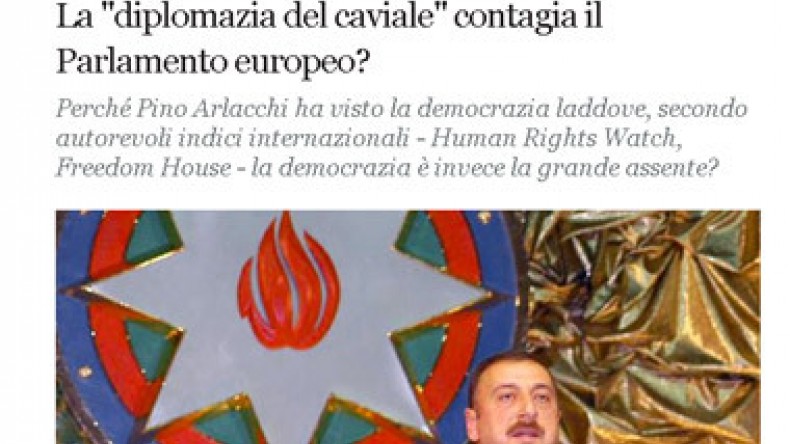
The ‘caviar diplomacy’ contagions the European Parliament?
Milena Gabanelli, Corriere della Sera, 7 November 2013
Why Pino Arlacchi has seen democracy in a country where according to the authoritative international indices - Human Rights Watch, Freedom House - democracy, however, is the big absent?
The planes that launch cluster bombs fly high and silently. The bombs exploded a few meters from the ground by shooting pieces of steel that amputate, blind and wound. This happened in Nagorno-Karabakh in 1992; the aircrafts were Azerbaijani and they were bombing the Christian Armenian population.
When told about that conflict a few knew of the existence of a tiny enclave who had just declared independence. A challenge that Azerbaijan does not tolerate because after 20 years of negotiations it is still refusing to sign a peace agreement.
But these details are ignored by the international media, what appears today is an Azerbaijan rich in caviar, gas and oil. A country with whom, we signed an agreement to export gas in Puglia on 11 August. We will do business with this State which has huge oil fields, and has increased its military spending by 2300 % in a few years. Certainly, we should have good relations, but should not ignore the fact that it is being governed for two decades by the authoritarian regime of the Aliyev family, which controls all the information.
On October 9, 2013 there were elections in Azerbaijan and the outgoing President was is re-elected for the third consecutive term with 85% of the vote. On October 10, Pino Arlacchi, MEP and head of 7 official observers of the European Parliament, said that the elections were "free, fair and transparent”.
On the same day the head of the OSCE / ODIHR in Azerbaijan consisting of 388 observers that has been there since August 28 stated that "these elections fall far from the OSCE standards.”
Why Pino Arlacchi has seen democracy in a country where according to the authoritative international indices - Human Rights Watch, Freedom House - democracy, however, is the big absent? It's a mystery.
In Europe the reactions were immediate: on October 16 after the preliminary discussion on the Arlacchi report to the European Parliament Ulrike Lunacek, a spokesman for Foreign Affairs of the European Green Party, speaks of elections characterized by "well-documented human rights violations, intimidation of opposition and restriction of the fundamental principles of democracy.” Werner Schulze, a spokesman for Foreign Affairs of the Greens / European Free Alliance adds that "a small number of members of the European Parliament is undermining the reputation of the entire Parliament in its struggle for human rights, democracy and the rule of law.”
On October 18, Hannes Swoboda, president of the group where Pino Arlacchi is a member, declares that “the group of Socialists and Democrats distancing itself from the results of the election mission to the recent presidential election," and adds, " dozens of activists in Azerbaijan and journalists , including a presidential candidate are unjustly imprisoned for their political activities . "
On October 22 it was the turn of Sir Graham Watson, President of Liberals and Democrats in Europe that was " concerned " with the conclusions of the Arlacchi mission, declares that " the report of the observers of the European Parliament would be laughable if its implications were not so serious and that the publication of election results before closing the polls shows that the elections were rigged.” The reference is to what the international press has dubbed as "app -gate" , i.e. the fact that an official app for smartphones Central Electoral Commission of Azerbaijan has published the results of the vote by giving the outgoing President Aliyev for winning the day before the elections. Finally, on October 23, the European Parliament was to open the debate on the relationship Arlacchi.
Today (November 7) the head of OSCE mission will explain the reasons of her criticism of the electoral process in Azerbaijan. There remains the question: why Arlacchi judged the elections “free, fair and transparent " in a country which appears to 139th place (out of 167) of the Economist Intelligence Unit's Democracy Index 2012 ? Maybe his is genuinely convinced, because in order to emancipate itself the Azeri regime does not spare resources and energy in broad image campaigns in Europe aimed at favouring parliamentarians, journalists and intellectuals.
A method called “caviar diplomacy “in Brussels and Strasbourg, reported last year by 2 reports of ESI (European Stability Initiative) . Even if we are not inclined to think badly, we do always remember that in 2001 the activity of Pino Arlacchi as head of the UN anti-drug agency was harshly criticized by the internal control of the United Nations and considered to be too much centralizing of power and with an opaque management, Kofi Annan suspended him from his duties.
Newsfeed
Videos






























